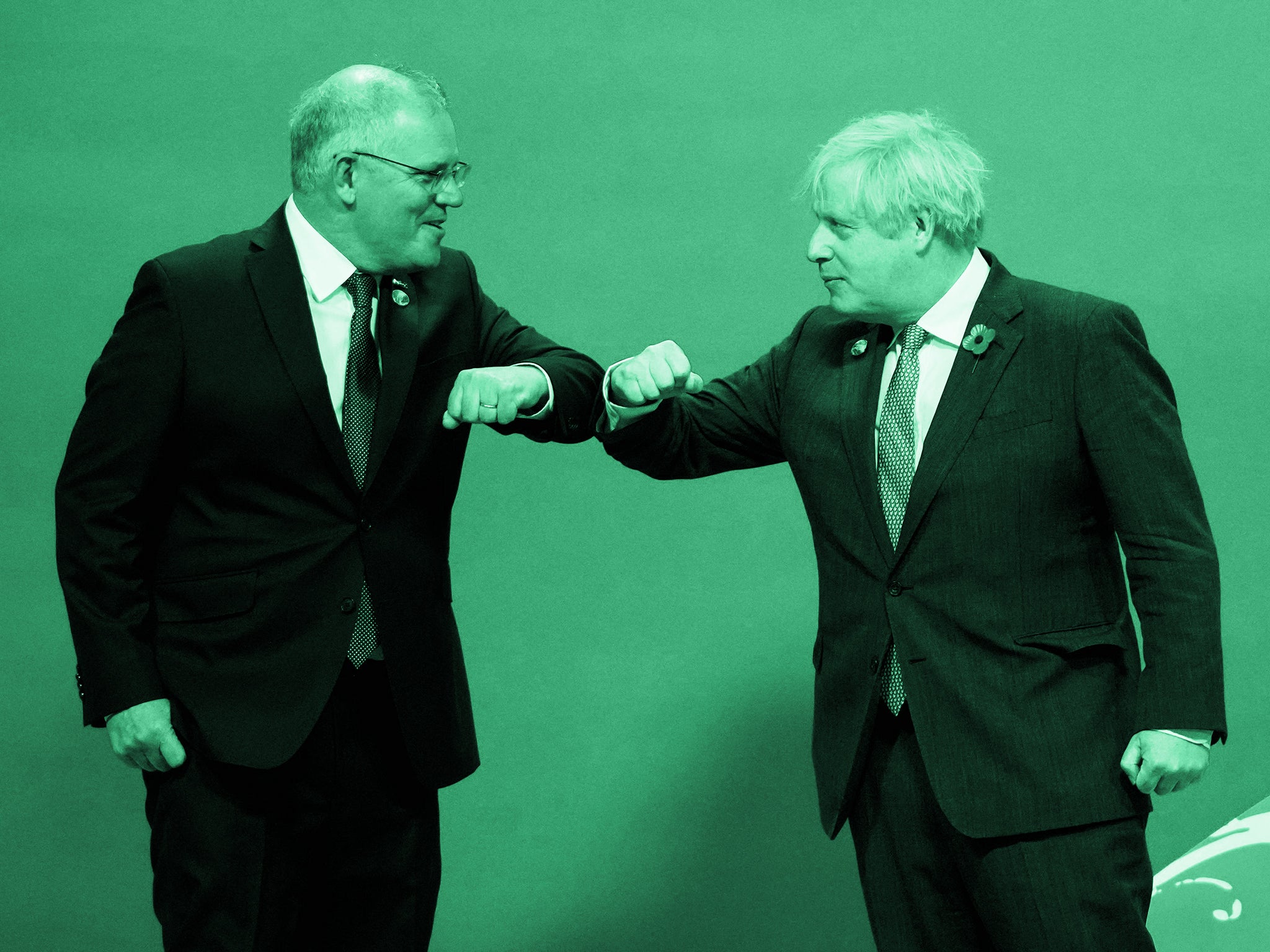UK-Australia trade deal: Did ministers cut climate pledges to clinch agreement?

Your support helps us to tell the story
From reproductive rights to climate change to Big Tech, The Independent is on the ground when the story is developing. Whether it's investigating the financials of Elon Musk's pro-Trump PAC or producing our latest documentary, 'The A Word', which shines a light on the American women fighting for reproductive rights, we know how important it is to parse out the facts from the messaging.
At such a critical moment in US history, we need reporters on the ground. Your donation allows us to keep sending journalists to speak to both sides of the story.
The Independent is trusted by Americans across the entire political spectrum. And unlike many other quality news outlets, we choose not to lock Americans out of our reporting and analysis with paywalls. We believe quality journalism should be available to everyone, paid for by those who can afford it.
Your support makes all the difference.Foreign secretary Liz Truss has poured cold water on reports the UK dropped key climate pledges from its trade deal with Australia – despite other ministers, as well as the Australian PM, previously signalling this was the case.
This latest twist follows a leaked government email from September, which revealed a decision by Ms Truss, then the trade secretary, and Kwasi Kwarteng, the business secretary, that the UK government could “drop both of the climate asks” from the text of the post-Brexit FTA (Free Trade Agreement).
Among the areas to be removed was “a reference to Paris Agreement temperature goals,” the email stated, however Ms Truss has now claimed this is “fake news”.
Pushed on the issue, by Sky News’ Kay Burley, at day one of the UN Cop26 climate summit in Glasgow, Ms Truss snapped and said “there is explicit mention of [the Paris agreement] in our trade agreement and what’s more, the Australians have committed now to a mid-century net zero target”.
What is the UK accused of doing?
Back in September, the leaked Cabinet Office email suggested Ms Truss and Mr Kwarteng had secretly dropped a series of climate pledges in order to get the government’s post-Brexit trade deal with Australia over the line.
The message revealed a binding section that referenced the “Paris Agreement temperature goals”, as well as multilateral environmental agreements, was scrubbed from the accord after pressure from Australia’s government – which has a notoriously weak record on climate action.
It came only a few weeks after Boris Johnson told MPs that any trade deal with Australia would, “include a chapter on trade and environment which not only reaffirms commitments to multilateral environmental agreements, including the Paris Agreement but also commits both parties to collaborate on climate and environmental issues”.
But, to get around the issue, Sky News, which first broke the story, reported government sources had confirmed references to temperature would be “implicit” rather than spelt out in the text of the trade treaty.
This likely explains Ms Truss’ insistence that there is a mention of the Paris agreement in the FTA, only it doesn’t actually include a specific figure – unlike in the UK-EU trade deal, where temperature commitments are laid out in detail.
What has the UK previously said about the allegations?
Reactions have been a bit of a mixed bag, and completely at odds with what Australia has said.
Mr Kwarteng, while claiming reports about the pledges being removed were false, appeared to concede exact temperature commitments had in fact been wiped.
Speaking at a New Statesman regional development conference on 9 September, he said it was “pure politicking” to suggest – as Labour MP Nia Griffiths had – the government signed off on a “lesser deal with Australia which lets them off the hook”.
“I didn’t recognise that issue that somehow we’d removed the Paris Agreement language,” he said.
However, as he went on there appeared to be some admission that there was no longer an exact figure included in the deal for combatting global warming.
“There may have been an issue about specifically putting the 1.5C on the face of the negotiating mandate,” Mr Kwarteng said, “but there was absolutely explicit reference in the Paris Agreement in the negotiating mandate, so I wasn’t quite sure where this story was coming from.”
Meanwhile, in a statement issued by a UK government spokesperson, on the same day as Mr Kwarteng’s remarks were made, the opposite was said.
“Our ambitious trade deal with Australia will include a substantive article on climate change which reaffirms both parties’ commitments to the Paris Agreement and achieving its goals, including limiting global warming to 1.5 degrees,” it read.
“Any suggestion the deal won’t sign up to these vital commitments is completely untrue.”
What has Australia said?
Scott Morrison, the Australian prime minister, conversely confirmed the reports were true, and told a press conference trade agreements were not the right place for climate targets.
Mr Morrison, whose stance on the climate crisis has caused controversy in the past, was asked about the claims the day after they were published by news outlets all around the world.
He said simply: “It wasn’t a climate agreement, it was a trade agreement. And I do trade agreements, and in trade agreements, I deal with trade issues. In climate agreements, I deal with climate issues.”
“We’re pursuing agreements on clean energy technology with a vast number of countries, and we’ll have agreements about that [at another time,” Mr Morrison added, before insisting other countries should “trust Australia” to abide by its climate commitments.
Pressed on the issue by reporters, though, Mr Morrison continued: “The key agreement we’ve made is when we signed up to Paris and the commitments that we made to achieve. Those commitments are clear. And we’ll not only meet them, we’ll beat them.”
Join our commenting forum
Join thought-provoking conversations, follow other Independent readers and see their replies
Comments